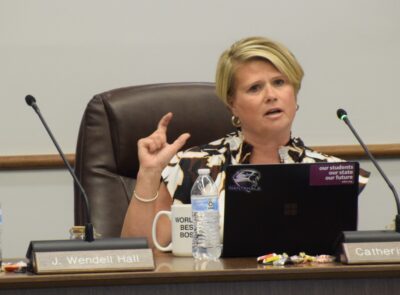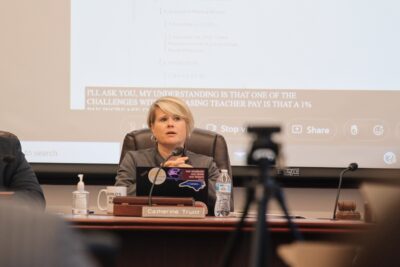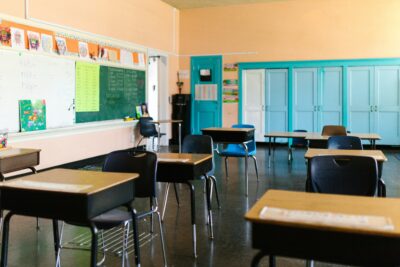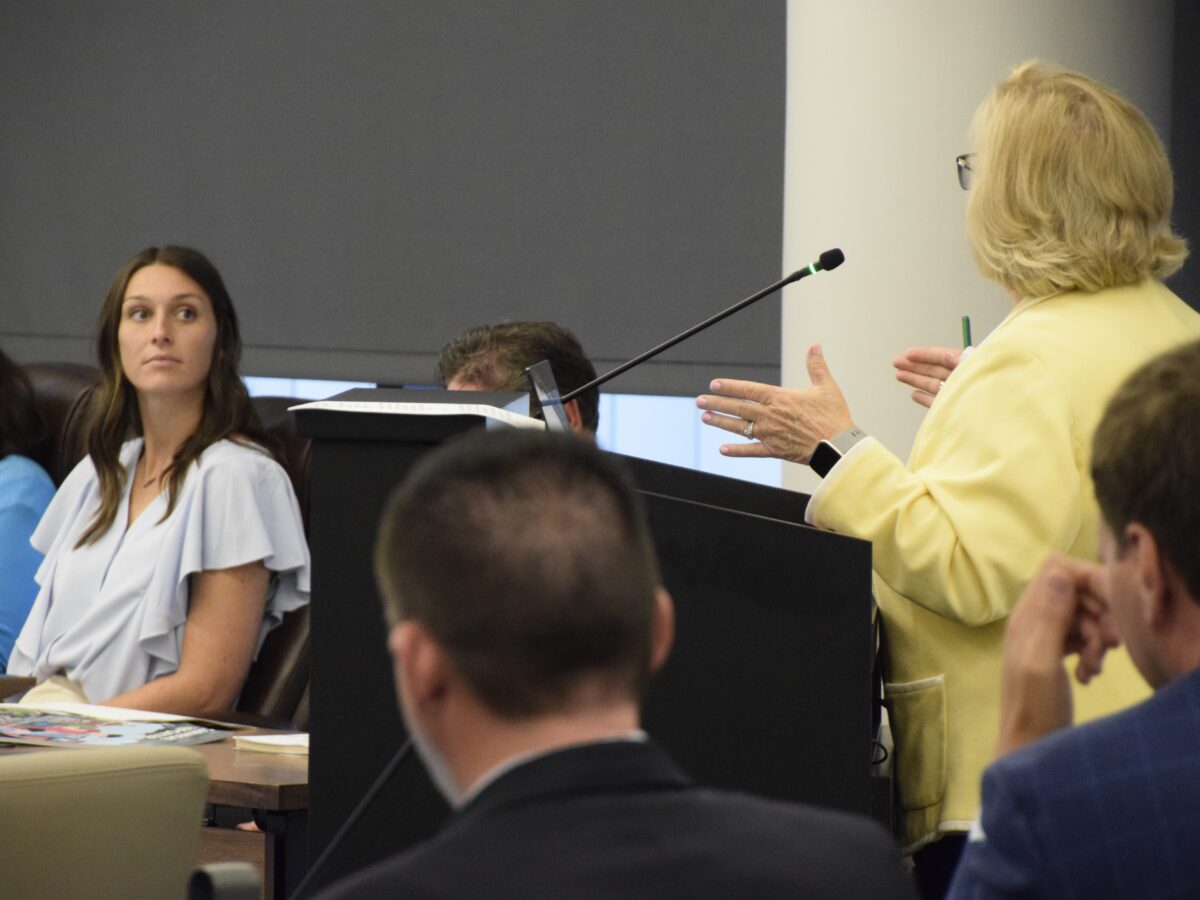
Data released by the Department of Public Instruction (DPI) last week show that North Carolina public school students continue to improve on tests in most grades and subjects from record lows at the start of the pandemic.
The 2023-24 state test results, which were presented to the State Board of Education last Wednesday, show that 54.2% of students passed state exams last school year, up from 53.6% during the 2022-23 school year.
While overall performance is still down from pre-pandemic levels in 2018-19, students have seen gains each of the last three years. DPI is working to support schools to ensure improvements continue to be made, DPI Senior Director of Accountability and Testing Dr. Tammy Howard told the Board.
“The data is a place of looking to see where we are, what happened in 2024… (and then) to focus on the real purpose of testing and accountability, which is school improvement and increasing student achievement,” Howard said.
![]() Sign up for the EdDaily to start each weekday with the top education news.
Sign up for the EdDaily to start each weekday with the top education news.
In North Carolina, students who receive a score of a Level 3 or above on end-of-course and end-of grade exams are considered “Grade Level Proficient” (GLP). Students who earn a Level 4 or above meet the Career and College Readiness (CCR) standard.
On Wednesday, Howard gave the Board a presentation showing progress on both measures.
Below is a look at Howard’s presentation on pandemic recovery in math, science, and end-of-grade courses, by grade level. Note that most subjects and grade levels are nearing pre-pandemic scores.
In English II, scores are the same as before the pandemic. In NC Math 3, the scores are higher than before the pandemic.
However, Howard noted, the highest rate of proficiency is still just over 60%.
“We just want to be very clear that we’re not suggesting that we are 100% to where we all aspire with student academic achievement, because we can very clearly see that line at the top, which is that 100%,” she said. “But if we look back to 2019, we can see that we are very close to that performance level, when we look at grade level proficiency.”
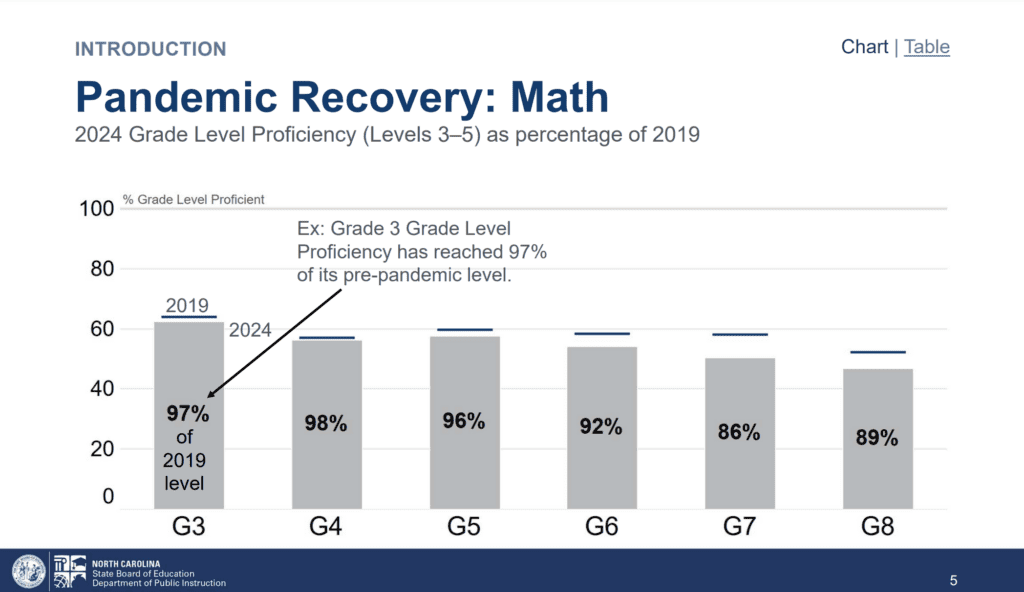
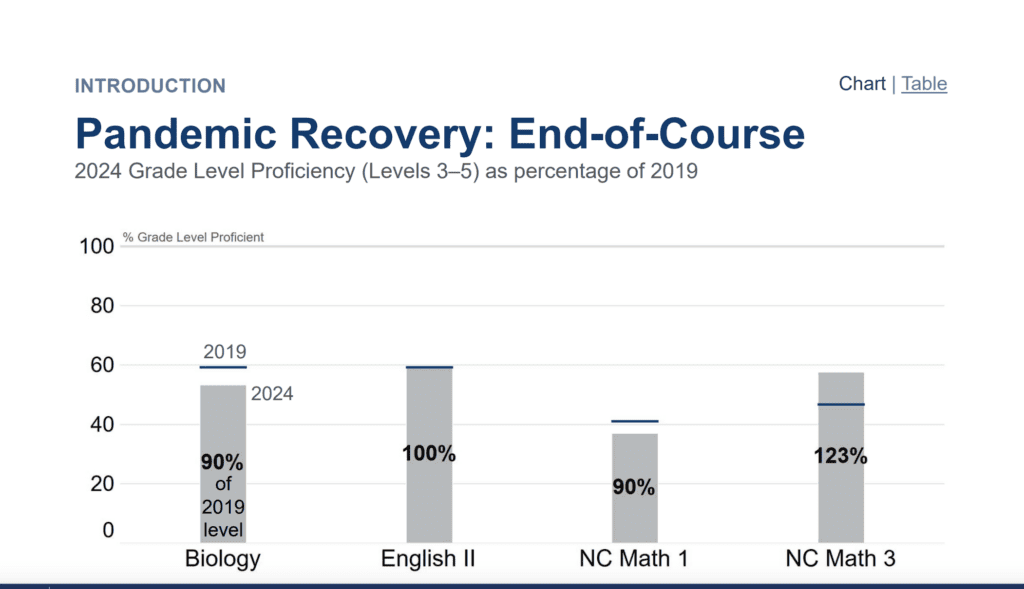
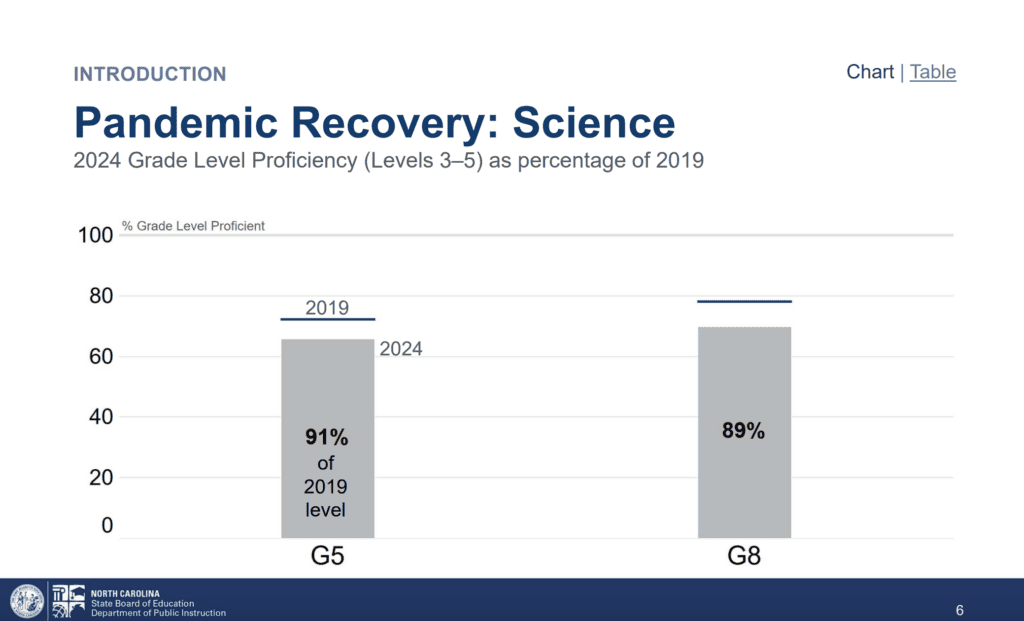
Here is at look at proficiency in reading. All grades except fourth and seventh grade showed increases from 2022-23.
In a DPI press release, Truitt called for additional literacy efforts for older students.
“As a state, we have invested an incredible amount of time and effort into teaching our elementary students essential literacy skills using the science of reading,” she said. “But many of our literacy supports fall off after third grade, and this year’s data shows us that focusing on elementary students, specifically kindergarten through third grade, is not enough.
“We must invest in similar, developmentally appropriate professional learning for middle and high school teachers as well,” Truitt continued. “This was a critical piece of our legislative agenda for the short session and must be something the legislature considers in the long session.”

Students who scored at the CCR standard for end-of-grade tests ranged from 26.5%-37.1% in reading, 29.6%-41.1% in math, and 54.5%-61.3% in science.
DPI also presented subgroup data, including for students with disabilities; students deemed “Academically or Intellectually Gifted” (AIG); English learners; economically disadvantaged students; and white, multiracial, Hispanic, Black, Asian, and American Indian students.
According to the data, white, Asian, and AIG students generally performed at a higher rate than students overall.
Take a look at the subgroup data below, organized by subject and grade level. If a bar is blue, that means it represents the highest score in three years. The white lines in each individual bar reflects the number of students who scored at the CCR standard.
“EDS” stands for Economically-disadvantaged students, and “SWD” stands for “Students with disabilities.
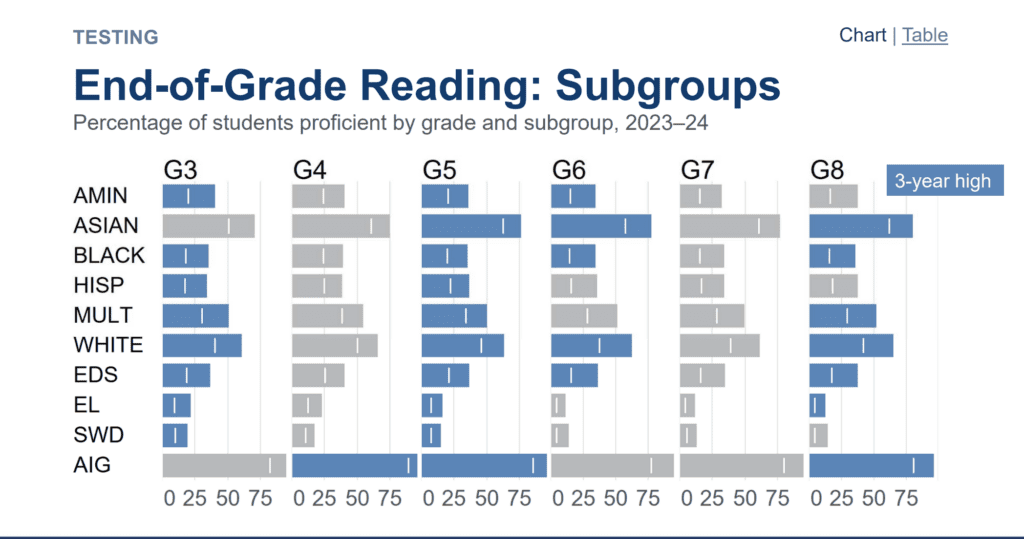
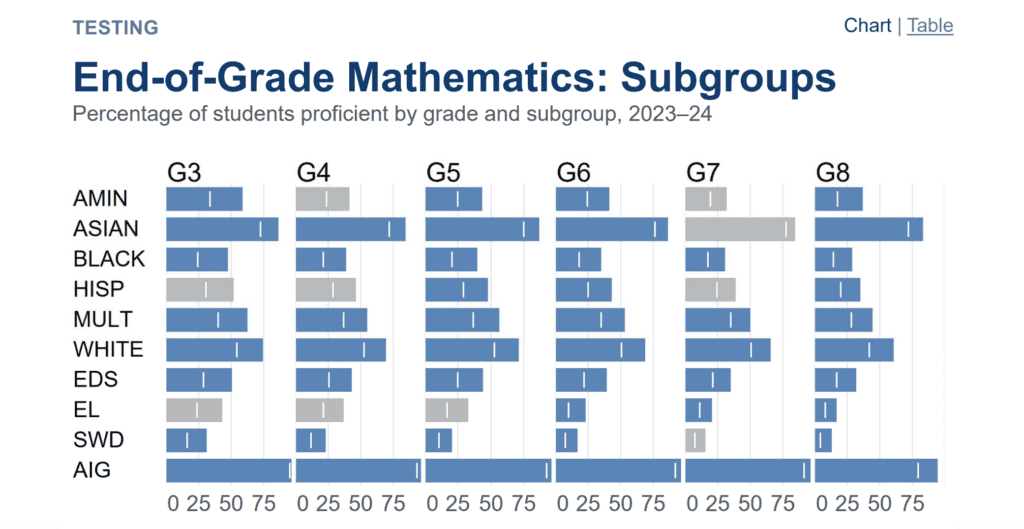
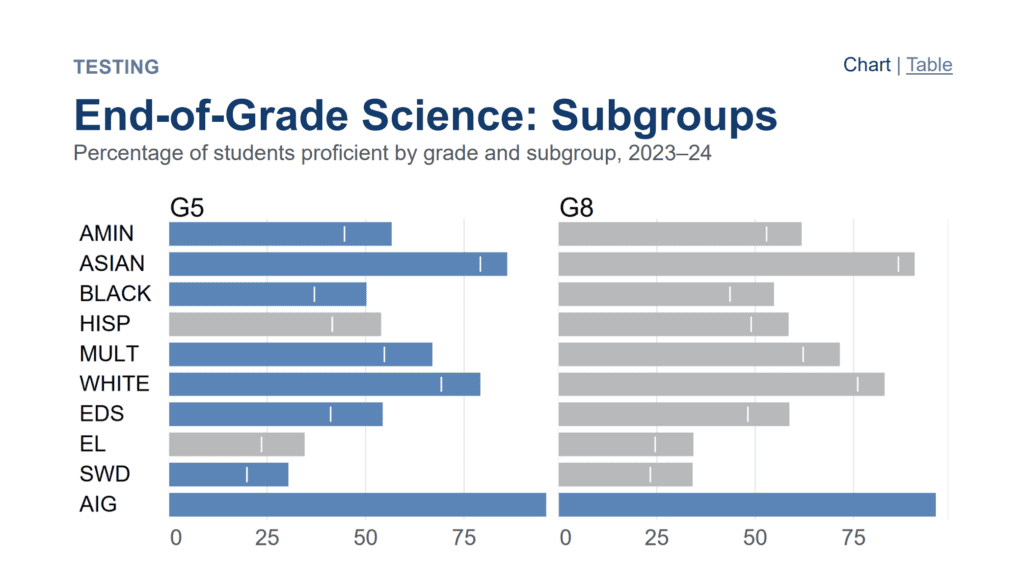
The overall end-of-grade science scores were 66% in fifth grade and 70% in eighth grade.
Board members discussed at length the need to meaningfully address these achievement gaps — also known as opportunity or equity gaps — that follow national trends.
Truitt said schools must do something different to improve outcomes for minority students. Board members specifically mentioned staffing, teacher support, and advocacy for a new accountability model — which would hopefully include more funding to better support student needs.
Truitt criticized the emphasis put on “high-stakes testing,” while also calling on education leaders to pay attention to low proficiency scores.
“If we do not find a way to fix these challenges, we are going to continue to repeat this cycle that we have seen for the last 20 years of our low income and students of color continuing to receive substandard education, despite the fact that teachers are working harder than ever before,” Truitt told the Board. “What do we need to be doing differently in order to ensure that all students have a chance to be proficient?”
On Thursday, the Board approved another report outlining plans for improving special education in North Carolina. According to that report, 19% of students with learning differences were reported as grade-level proficient in 2023.
The Board also approved a report on graduation rates in North Carolina, showing that 87.9% of students graduated during the 2023-24 school year — up from 86.5% the year before. You can view that report, along with subgroup data, here.
Read more

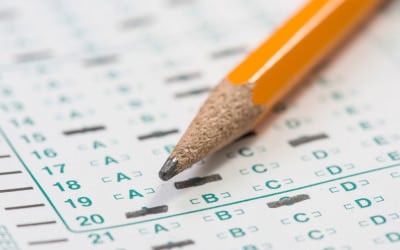
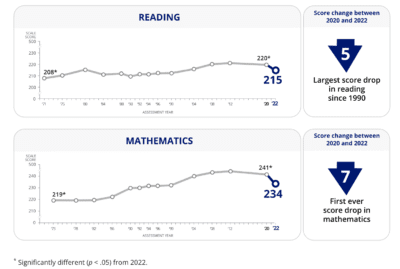
Along with testing scores, the Board also discussed school performance grades, which showed improvements from the prior school year.
In North Carolina, school grades are based on each school’s achievement score, weighted 80%, and on students’ academic growth, weighted 20%. Education leaders have long said that formula does not capture the full picture of the work happening in the state’s public schools.
“Over-reliance on tests and school performance grades can misrepresent school quality and mask both the growth and achievement of our students, as well as the challenges and obstacles they face,” Board Chair Eric Davis said on Wednesday. “Let’s use this data, not as a myopic judgment of school quality, but instead to inform and rededicate ourselves to our students and North Carolina’s public schools.”
Update on Weldon City Schools Board
In August, the Board voted to give the Weldon City School Board 60 days to resolve several issues before suspending the local board’s duties.
The Board’s primary concerns include the district’s continually low-performing academic status, frequent turnover and buyouts of superintendents, failure to retain quality administrative employees, and financial concerns. Additionally, the Board is concerned that the local board refused personnel recommendations made by Interim Superintendent Dr. Rodney Shotwell — appointed by the State Board of Education on July 11 — without cause.
“Since Dr. Shotwell’s appointment as the State Board appointed Interim Superintendent, the Weldon City Board has continually failed to cooperate with him and has otherwise hindered the ability to improve student performance in the Weldon City Schools,” the Board’s notice said.
The state Board’s notice included 18 demands to be met by the Weldon City School Board, including general, academic, financial, and personnel expectations.
The notice said that the Weldon City Board would be given an opportunity to appear before the State Board of Education within 45 days of the notice to provide a response to these areas of concern in an attempt to reach an agreement.
Last week, the Weldon City Board declined to appear.
“As a result, this matter concerning the possible suspension of the duties of the Weldon City School Board of Education will come before us at our October meeting,” Davis said on Thursday. “We remain steadfastly committed to providing the students of Weldon City Schools their constitutionally protected right to a sound education. We’re extremely disappointed with the Weldon City Board’s apparent lack of interest in cooperating with us to improve the Weldon City System for the benefit of the Weldon City School students.”
You can read the state Board’s full notice to the Weldon City Board here.
The Board also approved a motion to withhold $13,510 per moth from the Weldon City Board’s Central Office Administration allotment, in order to fund the state Board’s appointment of Shotwell as interim superintendent. You can read that document here.
On Aug. 2, the Weldon City School Board released a press release regarding the notices.
“The Weldon City Board of Education takes the information contained in those documents seriously and is carefully reviewing them with counsel. The board will not comment further on them at this time,” the press release says. “… The Weldon City Board of Education recognizes that there is work to be done, and is committed to working with its staff, families, community, and the State Board of Education and Department of Public Instruction to continue to improve education for students in the Weldon City Schools and to achieve its vision of serving as a model district for the state.”
Report on career and college ready program, remote instruction
The Board discussed an annual report on North Carolina’s Career and College-Ready Graduate Program (Program Outcomes), which must also be approved by the State Board of Community Colleges (SBCC).
In 2015, lawmakers passed legislation requiring the SBE and SBCC “to develop a program that introduces the college developmental mathematics and developmental reading and English curriculums in the high school senior year and provides opportunities for college remediation for students prior to high school graduation.”
That program is the Career and College Ready Graduates (CCRG) Program, which is a partnership between DPI and the N.C. Community College System (NCCCS). The program includes training, technical assistance, and professional development for local school districts.
The 2023-24 report, discussed last week, includes data on CCRG test completions, and key findings from a state survey and regional focus groups.
Here are program outcomes includes in the report:
In order to receive credit to enter North Carolina’s community colleges remediation-free, students must complete the math and/or English Tier Tests with an 80 or higher. Below indicates the pass rate for CCRG English and CCRG math:
- English Tier Test Completions:
- Among students who took the English CCRG content, 1,407 of students passed the English I tier tests and 590 passed the English 2 tier tests.
- That equates to a 24% pass rate for English 1 and 18% pass rate for English 2.
- For English 1, that is a 14% increase and for English 2, that is a 13% increase from the previous academic year (2022-2023).
- Math Tier Test Completions:
- Among students who took the math CCRG content, 5,412 of students passed the Math 1 Tier Tests, 4,286 passed the Math 2 Tier Tests, and 3,560 passed the Math 3 Tier Tests. That equates to 89% pass rate for Math 1, an 86% pass rate for Math 2, and an 89% pass rate for Math 3.
- For each of the tier tests—Math 1, Math 2, and Math 3—that is a 3% increase from the previous academic year (2022-2023).
The report included the following recommendations for the program moving forward:
- Continued collaboration between NCDPI and NCCCS.
- A review of eligibility criteria to increase access and equity based on the needs of students.
- Continued funding to support the CCRG implementation.
- Continue communication with constituents for strong implementation.
- Continue consideration of how CCRG English can be implemented more effectively.
“The NCDPI and NCCCS staff will work collaboratively to ensure greater communication to LEAs (Local Education Agencies) about the intent and benefits of CCRG to ensure greater access and opportunity to all subgroups,” the report says. “…This annual report presents a comprehensive evaluation of the CCRG program’s outcomes and demonstrates the program’s effectiveness.”
The Board also approved a report on the state’s Fifth Grade Career Awareness Program.
These activities include middle and high school tours, career related field trips, job shadowing opportunities, career fairs, and more.
According to the report, more than 200,000 fifth grade students were exposed to career awareness activities during the 2023-24 school year.
“Due to the emphasis being placed on Work Based Learning at the state and federal levels, we anticipate this program will continue to grow and expand across the state,” the report says.
Report on remote instruction
The Board also approved a report to the General Assembly on remote instruction during the 2023-24 school year.
The annual report includes a link to each local board’s remote instruction plans and the number of remote instruction days or hours used by each district. The report also briefly includes strengths, challenges, and trends in how districts provide remote instruction.
The screenshot below includes the state’s definition for remote instruction, and how many remote days a district can use per year.
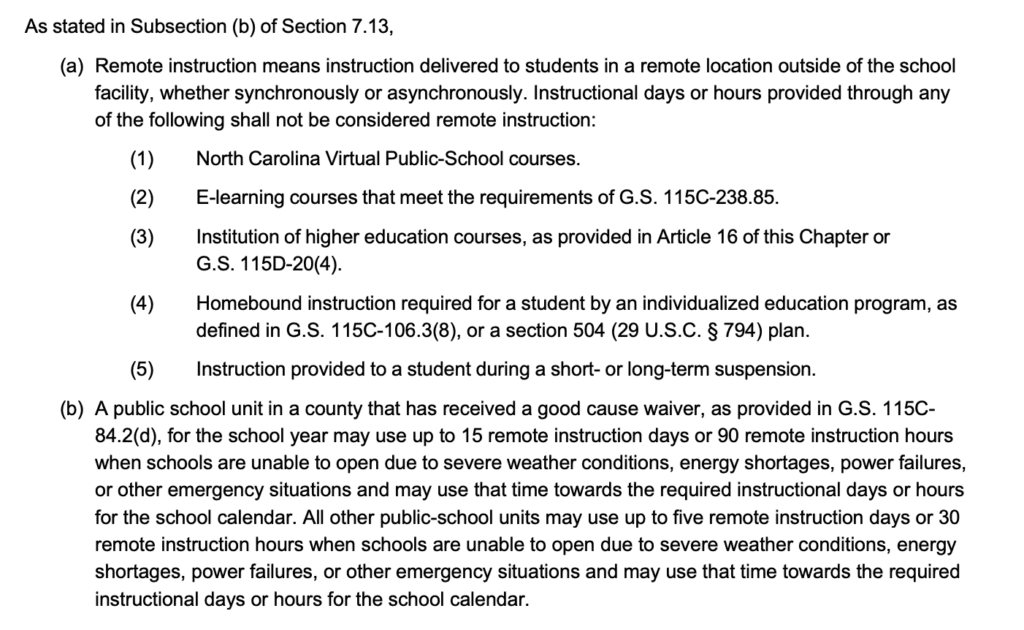
School districts reported several best practices in developing high-quality remote instruction plans:
- 1:1 device distribution
- Hotspot and Internet access
- Flexible instructional methods
- Use of Learning Management Systems (LMS) like Google Classroom and Canvas
- Professional development and support and strong communication channels
- Maintenance of academic rigor
- Preparedness and quick adaptation
“While PSUs have developed high-quality Remote Instruction Plans, challenges remain to ensure the most effective teaching and learning for NC’s public-school students,” the report says.
The primary challenges districts reported were access to technology and Internet, along with inconsistent instructional models.
Most districts emphasized only using remote instruction plans for emergency situations, like inclement weather, natural disasters, or temporary closures for health and safety context.
“Many public-school units express a commitment to continuously refining their remote instruction plans. This involves feedback loops, learning from past experiences, and seeking innovative solutions to improve educational delivery during emergencies,” the report says.
NIL policy moves forward, teacher bonuses, and more
The Board continued its discussion on NIL (name, image, and likeness) compensation for student athletes. The North Carolina High School Athletics Association (NCHSAA) previously allowed NIL deals in high school, until the Board reversed that decision in June in its updated temporary rule.
Last month, NCHSAA Commissioner Que Tucker told the Board the state needs a policy that offers students consistent and clear guidance, including on financial education.
On Thursday, the Board unanimously voted to move its draft policy for a permanent rule to a comment period. Only minor edits to the policy can be made after that period ends before requiring another comment period. The proposed permanent rule would take effect in January 2025.
This policy would allow for student athletes to make certain NIL deals, pending agreement from parents and legal guardians if the student is a minor.
Among other things, students would also be required to provide a copy of their NIL agreement to their head coach, athletic director, principal, local superintendent, and chairperson of the local school board. Students would also need to complete a course on NIL through the National Federation of State High School Associations.
Though every Board member voted to move the policy forward, several expressed hesitation about allowing NIL compensation for high school students.
“This is an extremely complicated issue,” Vice Chair Alan Duncan said. “Once we walk down this road, it will be extremely difficult to control.”
You can read the full proposal for NIL starting on page 18 of this Board document.
Here are other items from the Board’s meeting last week:
- As part of its consent agenda, the Board voted to approve its annual Consolidated Teacher Bonus Program Study and Report. Along with a list of bonuses offered to teachers in North Carolina, the report includes preliminary findings on the impact of offering bonuses. According to the report, data does “not necessarily indicate that the bonus motivated teachers to achieve high growth with their students in the following year or that teachers decided to remain in the district the following year due to an anticipated bonus.” The report did find that teachers who received a bonus were more likely to receive another bonus the following year.
- Davis was unanimously re-elected by the Board to serve as chair of the State Board of Education for another two years. Duncan was also unanimously re-elected to continue serving as vice chair.
- The Board voted to approve standards and a rubric for defining micro-credentials in public schools — developed through the partnership of states led by DigiLearn. You can view a presentation on the topic from last month.
- Finally, the Board also voted to give DPI’s Financial and Business Services “flexibility to manage funds, which would otherwise revert during the ESSER III closeout process, within all allowable expenditures and funding sources, as needed,” according to the Board’s agenda items. The deadline to spend the last round of federal Covid-relief funds is Sept. 30 — also known as the federal funding cliff.
The full Board meets next on Oct. 2-3.
Recommended reading
